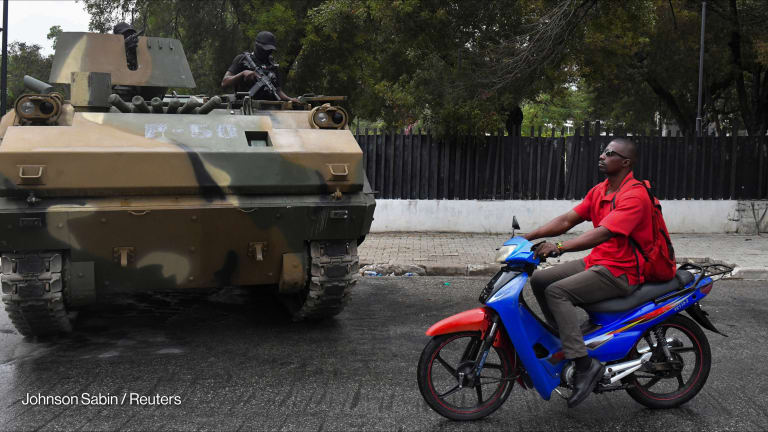
The U.S. government is pushing for an end to violence in Ethiopia’s Tigray region and for unrestrained humanitarian access, though progress has been limited, administration officials told lawmakers Thursday.
The Biden administration is considering further measures — including potential sanctions — if the parties to the conflict, including the Ethiopian government, do not act, the officials said at a Senate Foreign Relations Committee hearing.
The hearing came a day after President Joe Biden called for an end to violence and unimpeded humanitarian access to the Tigray region, while also urging Ethiopian leaders and institutions “to promote reconciliation, human rights, and respect for pluralism” in a statement. Lawmakers at the hearing went further than Biden, saying that Ethiopia must face consequences if it does not take action to address the concerns.
“The U.S. must transition from hands-off diplomacy to hands-on action,” said Senator James Risch, a Republican from Idaho and the ranking member of the committee.
He and other lawmakers praised recent Biden administration efforts, including limiting visas for Ethiopian and Eritrean officials involved in the conflict and using the U.S. voice and role in multilateral institutions to push for an end to the violence. But they also said they were wary of false promises and lack of action by Ethiopian Prime Minister Abiy Ahmed and others.
“Assistance is not enough to avert famine if actors in the region continue to restrict access.”
— Sarah Charles, assistant to the administrator, USAID’s Bureau for Humanitarian AssistanceIn November, the Ethiopian government launched a military campaign in the Tigray region that was ordered by Abiy after he said that the Tigray People’s Liberation Front attacked a federal military base. Months earlier, the TPLF had rejected the national Parliament’s decision to postpone elections and declared it did not recognize Abiy’s government as legitimate.
Clashes, including with Eritrean forces, have resulted in thousands of deaths, mass rapes, and displacement of local populations in a country that was seen as a stable ally in the region and continues to be viewed as a strategic partner by the U.S. and Europe.
Now, there are about 2 million internally displaced persons, 63,000 refugees, and about 5.2 million people in urgent need of assistance as a result of violence in the Tigray region, said Robert Godec, acting assistant secretary of state in the bureau of African affairs at the State Department.
“The violence, abuses, and atrocities are unacceptable and must stop now,” he said at the hearing.
While the Ethiopian government has said the crisis is over, it is in fact growing — and the result is near-famine conditions, with people in Tigray already dying of malnutrition and starvation, partly as a result of armed forces blocking humanitarian operations, Godec said. Those armed forces have not only sought to limit access and divert aid but have targeted aid workers. Recently, a U.S. Agency for International Development partner employee was killed in an attack.
The U.S. is providing $305 million in humanitarian assistance, distributed through international organizations and NGOs, but has suspended funding through the Ethiopian government for other programs. The U.S. support can feed 4 million people over three months, set up mobile health and nutrition units, and rehabilitate about 300 health facilities that have been damaged in the conflict.
It is also working to provide safe spaces and psychosocial support for women and girls who have survived sexual violence, Sarah Charles, assistant to the administrator in the Bureau for Humanitarian Assistance at USAID, said at the hearing.
She described the severity of the violence in Tigray, particularly the sexual violence, as the worst she had seen in her career of more than two decades and warned of an impending famine that would be the largest in the country since the 1980s.
Charles warned that the “assistance is not enough to avert famine if actors in the region continue to restrict access” to visas and critical communication devices for humanitarian workers. Continuous requests for the government to grant six-month humanitarian worker visas and permission to bring in communication equipment have not succeeded, she said.
Lawmakers pressed Godec for a State Department determination on whether crimes against humanity or war crimes had been committed in the Tigray region. The State Department is reviewing whether the actions meet the legal standards for those designations, Godec said.
The administration is also considering a stronger response to the situation, including sanctions on institutions and individuals that are supporting the conflict or limiting humanitarian access, he said.
Secretary of State Antony Blinken has “made very clear” that if the U.S. does not see immediate progress it will take further action, Godec said.
The U.S. Special Envoy for the Horn of Africa, Jeffrey Feltman, is heading to the region next week to continue pushing for a cessation in violence, humanitarian access, and to address another key issue — the creation of the Grand Ethiopian Renaissance Dam, which also was raised at the hearing.
The U.S. is supporting an African Union process to resolve the conflict over the dam, which, according to Godec, will likely be a two-stage process: an initial agreement on filling the dam, which is likely to happen in July; and second, determining a longer-term solution around water and its use, especially for Sudan and Egypt.
While there are technical solutions to the issues that the parties raise, what's needed is the political will to bridge the differences, he said.
Search for articles
Most Read
- 1
- 2
- 3
- 4
- 5








